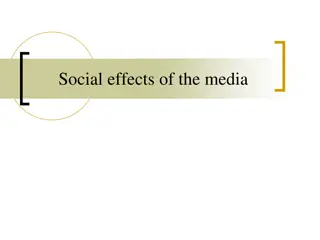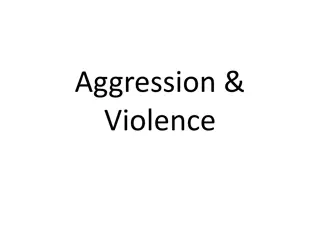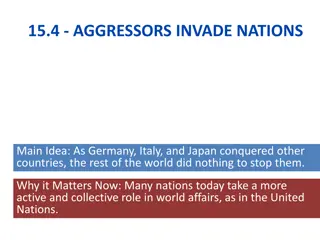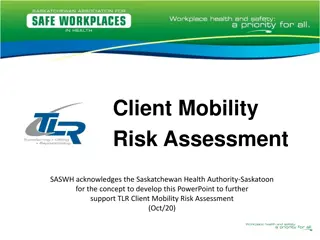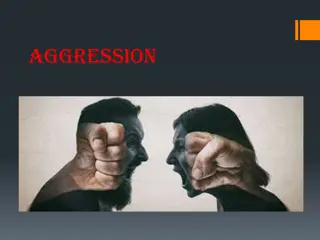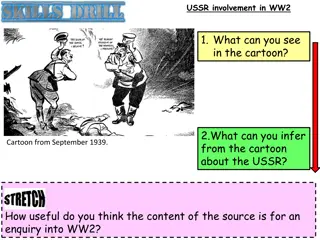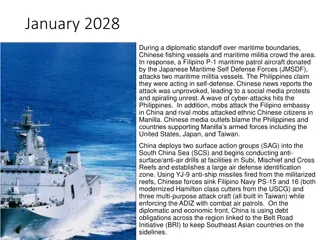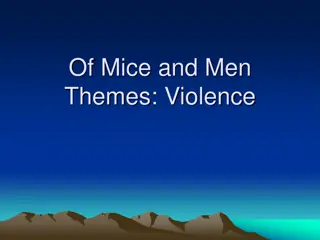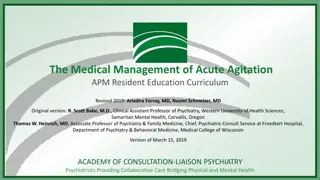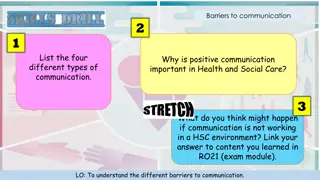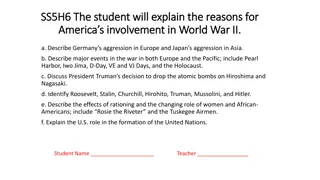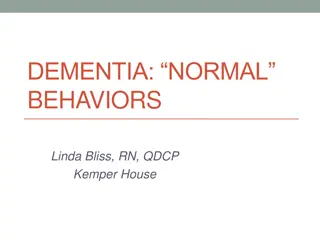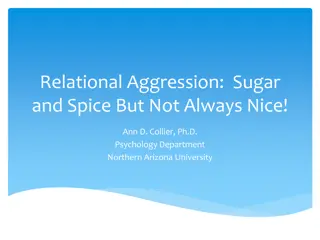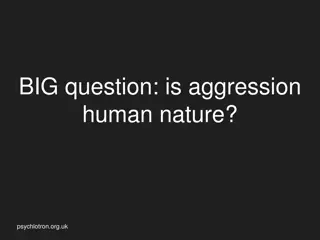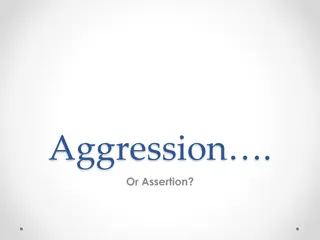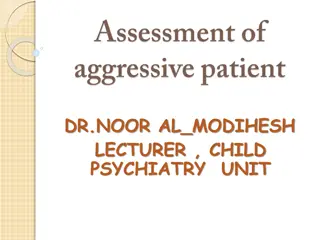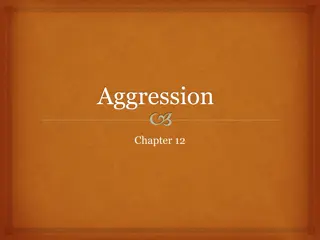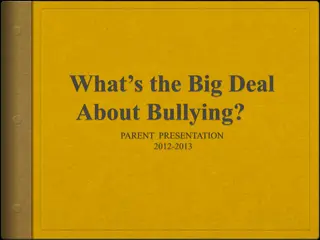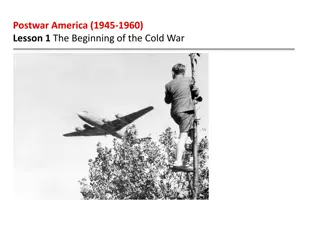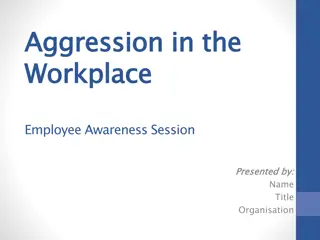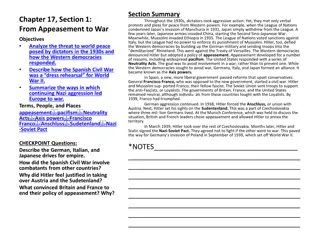Appropriate use of antipsychotics for changed behaviours in people living with dementia
Dementia is characterized by various changes, including behaviours such as wandering, disinhibition, agitation, and aggression. People living with dementia require care that can be approached through non-pharmacological and pharmacological strategies. The overreliance on psychotropic medications lik
0 views • 25 slides
Workplace Health and Safety Update - March 2024
The March 2024 update focuses on critical risk statistics, the safety topic of the month which is Aggression and Violence, and highlights the impact of these behaviors on individual and workplace health. It emphasizes the importance of recognizing signs of aggression and violence, de-escalation tech
3 views • 10 slides
The Impact of Reality Television on Society
Reality television, where fact is sometimes stranger than fiction, has a significant influence on society. This form of entertainment often showcases ordinary people in various scenarios, leading to desensitization and acceptance of negative behaviors like aggression and bullying. The ethical implic
7 views • 17 slides
Understanding the Impact of Media on Social Behavior
Explore the connection between media and societal behavior, focusing on the effects of exposure to violent content. Various theories and perspectives are discussed, shedding light on how media influences aggression and desensitization in individuals.
1 views • 43 slides
Dog Trainer Vero Beach
Since every dog is different, we at Applied Canine Concepts provide individualized training programs and dog trainer Vero Beach that are designed to satisfy your dog's particular requirements and behavior objectives. Our skilled trainers are available to assist you with any concerns you may have reg
0 views • 4 slides
Understanding Aggression and Violence: Theories and Influences
Exploring the concept of aggression, this content delves into various theories surrounding aggressive behavior, such as the Biological, Frustration, and Learned Social Behavior perspectives. It also touches on influences on aggression like aversive incidents, arousal, and media influence, while prop
1 views • 45 slides
National Monument Against Violence and Aggression: The Knife Angel in Blackburn Cathedral
Explore the reasons why people carry knives, the Lancashire statistics on knife crime, the strict laws regarding knife possession, and illegal blades to raise awareness and promote a safer community. The Knife Angel exhibit at Blackburn Cathedral emphasizes the impact of violence and aggression. It
0 views • 14 slides
Japan's Aggression in China: The Atrocities of Invasion
Japan's aggressive expansion in the 1930s led to the invasion of China, marked by incidents like the seizure of Manchuria and the brutal atrocities in Nanjing. The international community's failure to intervene effectively underscores the importance of collective action in global affairs, a lesson s
0 views • 24 slides
Mobility Risk Assessment Process in Client Care
The Mobility Risk Assessment Process in Client Care involves conducting initial assessments to determine baseline mobility, identifying risks, selecting appropriate moving techniques, and effectively communicating and evaluating risks throughout care. The assessment considers communication status, p
1 views • 31 slides
Understanding Aggression: Causes and Solutions
Aggression is any intentional behavior aimed at harming others, whether physically, verbally, or emotionally. It can be instrumental or hostile. Biological factors like hormones and neural substrates, social/cultural factors such as frustration and provocation, and environmental/situational factors
0 views • 10 slides
SWPBIS Implementation: Establishing District Support and School Readiness
Positive Behavioral Interventions and Supports (PBIS) focuses on creating effective environments to encourage appropriate behaviors. SWPBIS extends this approach to whole schools, applying systemic strategies to achieve positive outcomes and prevent problem behaviors. It is not a quick fix or just a
2 views • 18 slides
The USSR and Nazi Germany: The Pact of 1939
In the lead-up to WWII, the USSR signed a non-aggression pact with Nazi Germany, shocking the world. This pact included secret clauses dividing Poland and avoiding conflict for ten years. The USSR's alliance with Germany was a strategic move by Stalin due to fear of invasion and perceived weakness o
0 views • 13 slides
Indo-Pacific Crisis: Managing Chinese Aggression in 2028
In January 2028, a maritime standoff between China and the Philippines escalates, leading to cyber-attacks, social unrest, and military clashes. By February, the Indo-Pacific Command activates JTF 77 to counter Chinese aggression in the region, focusing on limited military objectives. Amidst escalat
1 views • 10 slides
Themes of Violence in "Of Mice and Men
The novel "Of Mice and Men" portrays various instances of violence, showcasing characters like Curley and Carlson as embodiments of aggression and menace. Lennie, with his unintentional force, also plays a significant role in the theme of violence. The contrast between the natural world and the cons
0 views • 8 slides
Understanding and Managing Acute Agitation in Medical Settings
This resource discusses the medical management of acute agitation, covering the behavioral spectrum, differential diagnosis, non-pharmacologic and pharmacologic approaches, and case scenarios. Definitions of agitation, aggression, and violence are provided along with descriptions of component behavi
0 views • 68 slides
Understanding Barriers to Communication in Health and Social Care
Communication barriers in Health and Social Care settings can hinder effective interactions. Positive communication is crucial in these environments to facilitate understanding and empathy. Recognizing and addressing barriers such as language differences, patronizing language, tiredness, inappropria
0 views • 31 slides
Understanding the International Criminal Court: Mission, Structure, and Impact
The International Criminal Court (ICC) was established in 2002 with the mission to end impunity for the most serious crimes affecting the global community. Through investigations, prosecutions, and trials, the ICC addresses crimes such as genocide, crimes against humanity, war crimes, and the crime
1 views • 22 slides
Understanding Sibling Conflict and Its Impact on Mental Health
Research highlights the prevalence of sibling conflict, emphasizing its association with negative behaviors in adolescence and adulthood. Addressing sibling aggression and victimization can lead to improved social skills development and better sibling relationships. Recommendations include parental
1 views • 18 slides
Understanding Social Hierarchies in Animal Behavior
Social behavior in animals involves living in social groups, establishing social hierarchies, and exhibiting dominance behaviors. Animals have developed various signals and behaviors to interact successfully within these groups. Social hierarchies offer advantages such as increased chances of surviv
1 views • 20 slides
America's Involvement in World War II: Causes and Impact
In this detailed study guide, students will explore the reasons behind America's involvement in World War II, including Germany and Japan's aggression, major events in Europe and the Pacific, President Truman's decision to drop atomic bombs, key figures like Roosevelt and Hitler, and the effects of
0 views • 13 slides
Understanding Normal Behaviors in Dementia Care
Dementia presents a range of normal behaviors that can be challenging for caregivers. By learning to identify triggers, interpret communication, and respond effectively, caregivers can provide better support for individuals with dementia. This session explores common behaviors like aggression, wande
0 views • 29 slides
Analysis of "Romeo and Juliet" Act 1 Scenes: Tone, Characters, and Themes
Act 1 of "Romeo and Juliet" sets the tone of the play as angry, hostile, tense, and aggressive through scene descriptions and character interactions. Benvolio emerges as the peacemaker, trying to diffuse conflicts, while Tybalt represents aggression and a desire for continued feuding. The Prince emp
0 views • 35 slides
Understanding Aggression: The Intersection of Theories and Applications in Violence Reduction
Exploring the multifaceted nature of aggression, this content delves into theories of violence, effects of trauma, current treatment approaches, and the future of using Eye Movement Desensitization and Reprocessing (EMDR) in reducing aggression. From defining aggression to examining early theories,
0 views • 64 slides
Tracing Verbal Aggression and Facework Strategies Over Time
Dawn Archer and Bethan Malory explore the tracing of verbal aggression and other facework strategies over time using themes from the Historical Thesaurus of English. They utilize automated content analysis tools to analyze datasets from various historical periods and propose solutions for prioritizi
0 views • 41 slides
Understanding Relational Aggression in Girls: The Impact on Social Relationships
Relational aggression, a form of social bullying, can have detrimental effects on girls' social relationships and self-esteem. This type of indirect aggression includes behaviors like exclusion, spreading rumors, and social manipulation. Understanding and assessing relational aggression is crucial f
0 views • 22 slides
Understanding Aggression: Exploring Its Evolutionary Roots
Delve into the complexities of human aggression, questioning whether it is inherent or a learned behavior. Explore evolutionary theories and biological perspectives on the causes of aggression, examining how factors such as genetics, brain structures, hormones, and environmental pressures may influe
0 views • 11 slides
Understanding the Dynamics of Aggression and Assertion in Competitive Environments
Aggression is intentional behavior aimed at harming others, while assertion is forceful yet non-harmful conduct within the spirit of competition. Factors like antecedents, perceived unfairness, and pressure to win can trigger aggression in sports. Recognizing the differences between hostile and chan
0 views • 10 slides
Addressing Challenges in Community Rights and Development Aggression
The problem highlighted is the improper lensing of rights in communities, leading to aggression and knowledge gaps. Communities often do not engage due to cultural differences, political pressure, or corrupt practices. There is a lack of transparency and information availability in development proje
0 views • 6 slides
Understanding Cat Aggression and How to Deal with It
Cat aggression towards humans can stem from various reasons such as fear, handling issues, play-related behaviors, pregnancy, pain, or redirected aggression. This behavior can vary among different cat breeds. Recognizing the triggers and responding appropriately is essential to manage and prevent ca
1 views • 9 slides
Understanding the Nature vs. Nurture Debate in Aggressive Behavior
Aggression is a prevalent issue in society, with factors like biology (testosterone levels, genetics) and environment (parental influence, exposure to violence) playing crucial roles. The debate on whether aggression stems from nature or nurture is explored through various perspectives, such as etho
0 views • 35 slides
Understanding Agitation and Aggression in Psychiatric Patients
Agitation is a tension state characterized by anxiety and hyperactivity seen in depression, schizophrenia, and mania, while aggression involves hostile thoughts or actions towards others, common in impulse control disorders. Psychiatric patients are usually not aggressive, but certain mental illness
0 views • 16 slides
Understanding the Difference Between Aggression and Agitation in Psychiatry
Aggression involves verbal or physical attacks, while agitation is a state of mental disturbance leading to physical restlessness and increased arousal. Both can be common presentations in psychiatric emergencies with various risk factors and management strategies involved, including verbal communic
0 views • 14 slides
Insights into Aggression: Causes, Gender Differences, and Influencing Factors
Aggression is intentional behavior aimed at causing harm, with instrumental and hostile forms. Gender differences show males are more physically aggressive, while females engage in relational aggression. Aggression is influenced by situational and cultural factors, with influences from alcohol. Unde
0 views • 31 slides
Understanding Bullying: Types, Impact, and Prevention
Bullying is a serious issue affecting many individuals, especially in school settings. It can lead to devastating consequences such as drops in grades, convictions, and even suicides. The different types of bullying include physical aggression, social alienation, verbal aggression, intimidation, cyb
0 views • 11 slides
Managing Combative Residents in Long-Term Care
Residents in long-term care facilities may exhibit combative behaviors due to underlying psychiatric conditions, cognitive impairment, or dementia. This aggression poses challenges for both staff and other residents. Caregiver training is crucial for identifying triggers and managing combative episo
0 views • 17 slides
The Beginning of the Cold War: Postwar America (1945-1960) Lesson 1
Postwar America (1945-1960) Lesson 1 explores the unraveling of the wartime alliance between the United States and the Soviet Union, President Truman's response to Soviet aggression in Eastern Europe, and the causes and results of Stalin's blockade of Berlin. The background of the Cold War, Soviet a
0 views • 22 slides
How Sports Help with Aggression: Let's Share Our Games 2019
Understanding aggression and its different types is crucial in addressing harmful behaviors. Engaging in sports activities, such as basketball, soccer, and martial arts, has been shown to reduce aggression by promoting self-control skills and channeling negative emotions into physical activity. Team
0 views • 9 slides
Collective Security in International Relations: A Comprehensive Overview
Collective security is a crucial concept in international politics, aimed at maintaining peace and preventing aggression among nations. This system calls for joint action to counter threats to global peace, originating post-World War I with the League of Nations. Based on four key principles, nation
0 views • 8 slides
Workplace Aggression Awareness Session: Understanding and Prevention
This employee awareness session sheds light on workplace aggression, its definition, effects, sources, and management. It outlines employer and employee responsibilities, current control measures, and provides training objectives to enhance awareness and prevent harm. Additionally, it emphasizes the
0 views • 32 slides
Dictator Aggression and the Outbreak of World War II in the 1930s
Throughout the 1930s, dictators such as Hitler, Mussolini, and Japanese leaders took aggressive actions that threatened world peace. Western democracies responded with verbal protests and a policy of appeasement, allowing dictators to expand their empires unchecked. The Spanish Civil War served as a
0 views • 4 slides



